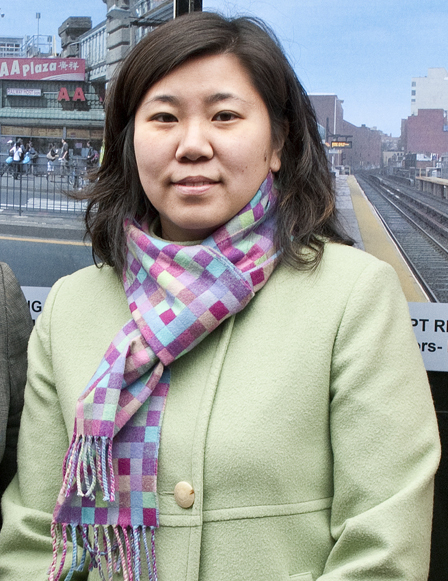Without understanding anti-Asian racism in at least some depth, it’s difficult to know how best to address it. (See Part 1 and Part 2.) But understanding by itself isn’t enough, of course. Here are some possible ways to address Asian American and Pacific Islander (AAPI) hate. At least one of them should be a good option for you.
Believe Asians When They Tell You They Experience Racism

In an opinion piece for the Religion News Service, Raymond Chang and Michelle Ami Reyes of the Asian American Christian Collaborative describe how many people dismiss the idea of anti-AAPI attitudes:
It is exhausting to appeal over and again to the commonalities we have as image bearers of God (Gen. 1:27). When we ask others to care for us, we are often met with logical arguments minimizing our factually based, lived experiences. We can’t tell you how many times we’ve shared instances where someone has called us a racist Asian slur or treated us in patterns consistent with how other Asian Americans have experienced life in America (in and out of the church), only to find someone say, “That couldn’t be true. I’m sure you’ve misheard that. That’s hard to believe it actually happened.”

Social Psychologist Michael W. Krause, of the Yale School of Management, writes that stereotypes of Asians as “foreign, dirty, and disease ridden” have a long history in this country. The Trump administration was merely building on that hateful tradition—Asians as a threat, in Prof. Rah’s vernacular. However, the model minority myth leads many to assume that, because Asians are proffered as evidence for the veracity of The American Dream, their lives are good and easy and prosperous—Asians as a pet. In Krause’s research, he finds that many Americans believe that “racist violence of the past is a relic and progress is a guarantee.” As a result, they simply don’t believe that anti-Asian bigotry should be taken seriously.
When we read of anti-AAPI hate crimes, or Asian friends and colleagues tell us about the racism they experience, we need to believe them, to set aside our own racial narratives and hear what they have to say.
Be on the lookout for anti-Asian stereotypes—in others and in yourself:
It can be difficult to notice when we are stereotyping. The complexity of stereotypes about Asian Americans and the fact that some of them appear superficially positive can further lull us into a false sense of security. But we can learn to do better. Be alert to the content of our cultural stereotypes about Asians. If you hear someone say, “What do they have to complain about? They’re all doctors and engineers,” be reminded of the “model minority” trope. If you find yourself responding viscerally to the possibility that Asian Americans are carriers for Covid or any other disease, remember that fear comes from a history of hate, not from virology. If you are overly curious about where someone is “really” from, set that aside and let them disclose their personal history, if they wish, in their own time and on their own terms. And remember the power of emotions like envy that are evoked when people are assumed to be smart and successful, but not truly “one of us.” If you see that happening, name it, call it what it is, and its grip will begin to weaken.
Expect action from the government, at all levels:
Local government officials are especially important in responding to hate crimes and other forms of discrimination. Do the police in your community have a good relationship with AAPI people they serve? Are mental health services available in Asian neighborhoods? If so, are they culturally appropriate? Offered in the languages people speak? Do local prosecutors take anti-AAPI discrimination seriously? Are elected officials responsive to the needs of Asian-American constituents? Do public schools offer English as a Learned Language, if needed? Are they hiring teachers and other staff who represent the various backgrounds of their students?

On the federal level, we need to make anti-AAPI bigotry a bi-partisan issue. Within just one week of his inauguration, Pres. Biden signed a memorandum directing the Department of Justice to do a better job of collecting data on anti-Asian hate crimes and other incidents of bias in order to respond more effectively. Both the U.S. House and the Senate sent letters to the DoJ in 2020 requesting such action, but they received no response. Last September, when Rep. Grace Meng of New York of introduced a non-binding resolution in the House condemning Covid-related bias against Asians, three Democrats missed the vote and 229 voted yes. Twenty Republicans missed the vote, 14 voted yes, and 164 voted no. I find that remarkable, and very sad. If you are a Republican, please work within the party to make it acceptable to oppose anti-AAPI hate.
Take specific steps yourself:

The Asian American Christian Collaborative offered a long list of ways to support AAPI people at this time. I recommend reading the entire list, but here’s a quick summary:
- Speak up! Talk with teachers, pastors, co-workers, elected officials, and friends about the painful reality of anti-AAPI hate and the need for a shift in both culture and politics.
- Sign the AACC Statement on Anti-Asian Racism in the time of Covid-19.
- Support AAPI people in your community—patronize their businesses, donate to victim assistance funds and development initiatives, get to know AAPI people and help develop stronger social networks.
Asian Americans Advancing Justice has partnered with Hollaback!, an organization that provides instruction in bystander intervention, on a series of workshops to provide training in stepping up when you witness anti-Asian harassment. I haven’t participated yet in a workshop, so I can’t endorse it personally, but it’s something to consider.
Most of us, myself included, just need to know more about Asian Americans and their experiences. Please be intentional about following Asians and Asian-Americans on social media, especially those involved in anti-racist work. The PBS series on Asian Americans just scratches the surface, but it’s a good place to start. Follow that up with a good book. Anything by or about Grace Lee Boggs or Fred Korematsu. New York Magazine has some excellent suggestions. You’ve got the internet. Use it, and find something that looks interesting to you. And then use what you learn to be an effective ally for our Asian Amcrican sisters and brothers.

